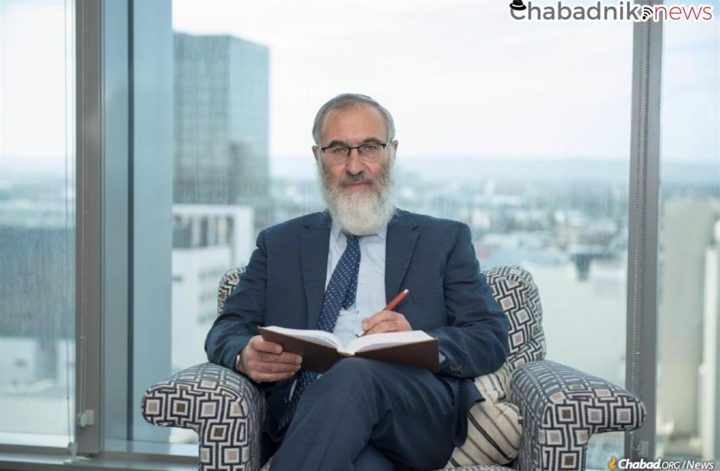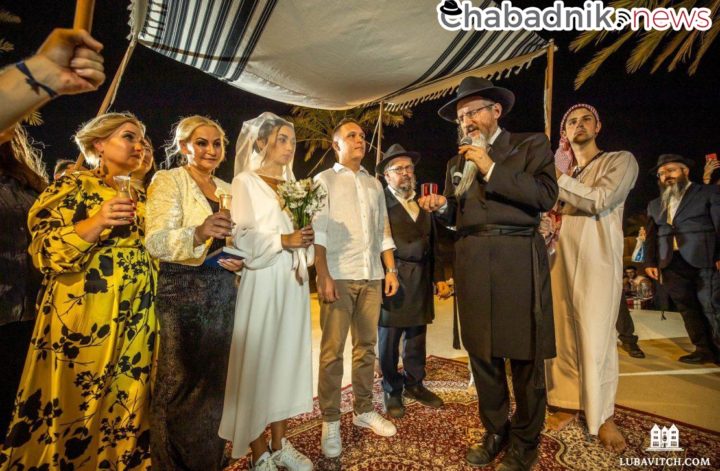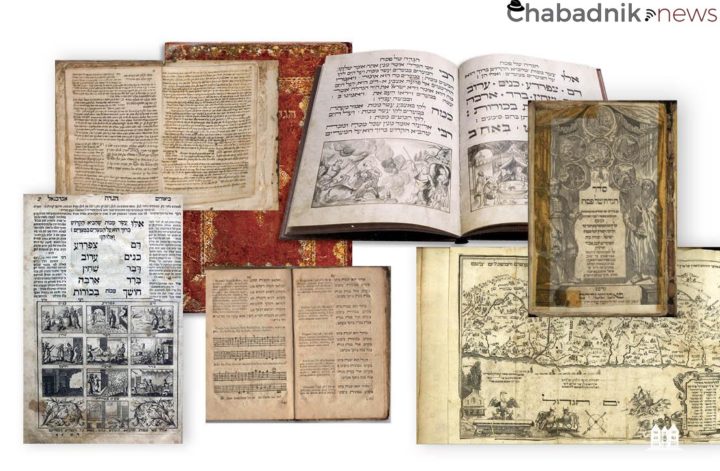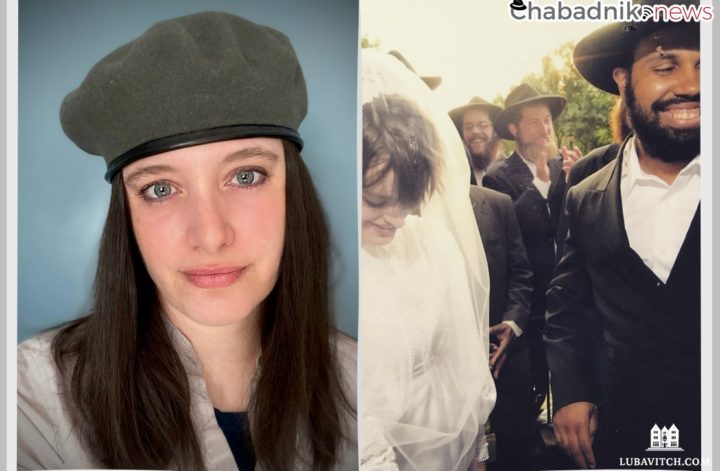Educator, rabbi and judge speaks to Chabad.org in a wide-ranging interview
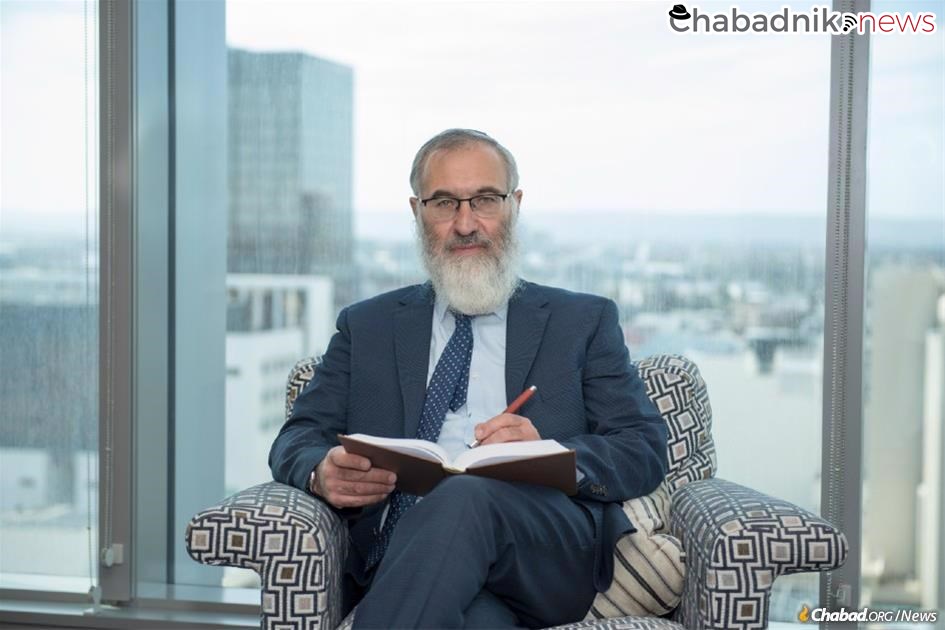
Fifty-eight-year-old Rabbi Justice Marcus Solomon is a graduate of Chabad-Lubavitch yeshivahs in Australia, Israel and America. He was ordained as a rabbi before going on to study law in his native Australia.
In 1987, he and his wife, Linda, married in Perth, where he took an active role in its only Jewish day school, teaching there while attending university and law school. Following a distinguished career as an attorney, in August 2021, Solomon was appointed a justice on the Supreme Court of Western Australia—the highest legal appointment in the state—by Attorney General John Quigley.
Chabad.org spoke with Rabbi Justice Solomon to learn more about his life and communal responsibilities, as well as his advice on Jewish education in the 21st century.
Q: How did an Australian Jewish boy end up pursuing rabbinical studies across the globe?
A: I grew up in Perth, which has a relatively small Jewish community. It’s a much smaller community than Sydney and Melbourne, numbering between 7,000 and 8,000 Jews. When I finished 10th grade, my parents sent us—myself, my brother and my sister, each when we finished 10th grade—to Melbourne, to finish 11th and 12th grade in Yeshivah College.
I boarded at the Rabbinical College of Australia and New Zealand—better known as “Yeshivah Gedolah”—where I continued to study after finishing school. Then I went to Kfar Chabad (the central Chabad yeshivahin Israel) and then to “770”—part of the kevutzah group of students that would travel from Israel to spend a year with the Rebbe (Rabbi Menachem M. Schneerson, of righteous memory). After the group left, I stayed on longer at 770. I then went back to Perth, where I began teaching in the local Jewish day school while studying in university. Initially, I did education, arts, philosophy and politics; then I went to law school.
Q: How did you make the career choice between Jewish education and law?
A: I’ll tell you a story. It was in 1991. To finish my degree, I had to essentially do an apprenticeship in a law firm for a year. I had to step back from full-time teaching. After I’d done that for a while, I wanted to go back, but I was in somewhat of a quandary as to whether that was the best thing to do—to go back into education, and whether I should do that in Perth or elsewhere. By then, I was married.
Chaim New, of blessed memory, in Melbourne, was in my year in school; he and I were lifelong buddies, very close friends. I was telling him about this dilemma I had, whether to stay a lawyer—I really wanted to go back into chinuch (Jewish education)—and he encouraged me to ask the Rebbe for advice.
I was hesitant; I did not ask the Rebbe questions of that nature. I thought I should work it out for myself. I also thought that he had real problems to deal with in relation to people with real tzores (“hardships”) in their life, not my dilemmas.
One thing led to another … Chaim New got Rabbi Joseph Gutnick involved, and they persuaded me to ask the Rebbe. I wrote to the Rebbe, explaining, “these are my options; this is my predicament.”
The answer that came through Rabbi Binyomin Klein, the Rebbe’s secretary, was that I should remain in the legal profession, and devote my spare time and energy to chinuch (Jewish education), and that I would be successful in both. And so that’s what I did.
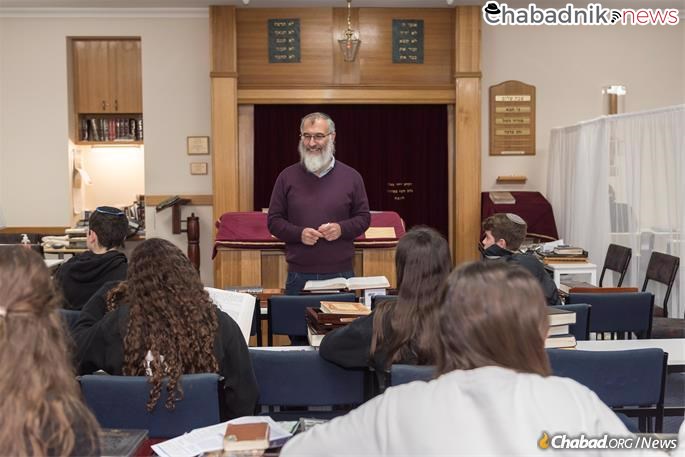
Q: How did you apply the Rebbe’s answer to your life?
A: Together with others, I started up the Beit Midrash of Western Australia, where we had Torah learning programs—especially for kids, to supplement the Jewish day school, where the kids get a Jewish identity and an excellent basic Jewish-studies program, but not much of a serious Torah education.
This was the time of the big South African Jewish immigration. The community was growing—indeed, booming—so we started a program that focused exclusively on Jewish studies on the weekend, Shabbat and Sunday. I devoted a lot of energy to it—I still do—for three to four hours every Sunday.
Thank G‑d, we built up a nice, observant, Shomer Shabbat community, where kids were going to yeshivahsand seminaries at the end of 12th grade. And it was very successful.
The next part of the story (in relation to my appointment) is that when the attorney general and premier of Western Australia issued the press release for my appointment, which usually gives a summary of the person’s legal background, but in my case (and I had no input), the way they described me was as a barrister and educator. So that reflected precisely the blessing that the Rebbe had given me 30 years prior—that I should stay in the legal profession and devote my time to Jewish education, and that I would have success in both.
It was quite extraordinary to have that fulfillment of the Rebbe’s words exactly 30 years later.
A lot of the stories you read today are about the Rebbe’s connection with individuals and everyone’s turn for a personal connection came at the right time. Mine came some years later; it took 30 years for me to fully appreciate it.
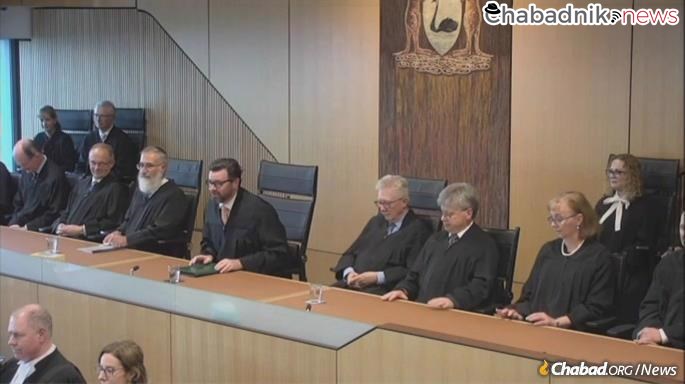
Q: You spent years exclusively studying Talmud and Chassidic philosophy. Did that get in the way of your secular education and career?
A: If your question is,does it detract from your prospects in the world to have a few years of Jewish studies exclusively, my answer to that is not only does it not detract from your prospects and your development and your maturity, it enhances it. You will bring to the professional world and the broader society a perspective and an insight into humanity that people who don’t have that experience—immersing themselves in something out of the normal society—ever have.
And in my experience, I have only ever encountered the greatest of respect for my background. No one has ever said to me “You can’t advance because you spent five, six years pursuing theological studies or some spiritual discipline, and therefore you are ill-equipped to pursue a professional career.” Actually, my background allowed me to stand out as someone who brought something unique to the practice of my profession in a manner that engendered enormous respect.
I can only tell you my experience, but I do believe that the broader society—the broader, secular society in which we all operate—actually craves something deeper than simply the pursuit of money and the pursuit of professional success. People in the broader secular society crave something deeper in their lives, and they only have the greatest of respect for people who have immersed themselves in that before they pursue a professional career because they regard them as bringing something unique and important to a professional environment.
When I was a barrister, I had in my chambers a group of non-Jewish people. We sat down and learned Chumash together because they wanted me to share with them “ancient wisdom.” We used to get together every so often—we’d have a bottle of scotch; everyone would have a Hebrew-English Tanach; and we would read and discuss a parshah, and talk about it, because they were thirsting for values, for values beyond the secular society; they were craving for depth.
I would say to any parent that has hesitancy or doubt about the value of a yeshivah education: Of course, secular education is also a good thing, but not at the expense of a truly immersed experience in Jewish learning.
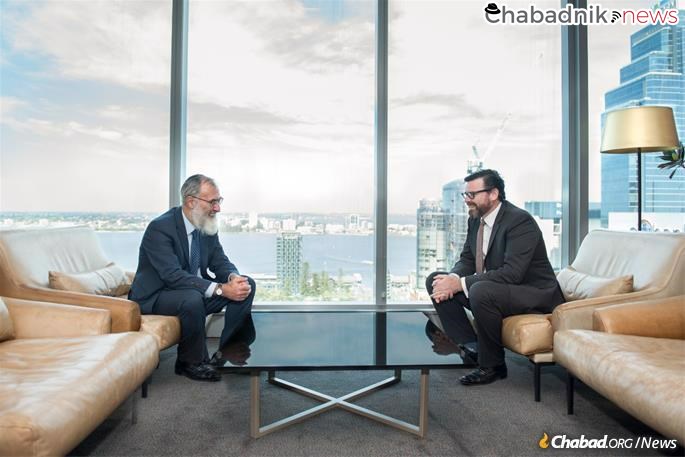
Q: And how did your rabbinic training inform your legal development?
A: One can say the obvious: that is, we are trained with the yeshivah background to distill legal and factual situations, and simulate them in a way that arrives at a conclusion. We all spend days in yeshivah doing that. Also, of course, the pastoral aspect of one’s yeshivah education—not just a general yeshivah education but particularly, one focused on the Rebbe’s objectives of kindness and helping others—gives you a perspective and commitment to humanity, which, obviously, is extremely important in taking a role in resolving conflict, which is what a judge does.
At the end of the day, the Rebbe’s life, the message he gave people, was to devote themselves to community service. Becoming a judge means you cease to be a lawyer, to advance private interests, and to commit your professional career to the public interest and the resolution of conflict. That’s a pretty important principle in Judaism. In that way, my yeshivah background is consistent with that objective.
Q: How will you balance your work in the Jewish community with being a judge?
A: Judges are encouraged to participate in community service, and so in the same way that I had to balance what I do in the Jewish community with the pressures of being a Senior Counsel, it’s really no different now—just not sleeping very much, frankly. But obviously, I have a level of public profile now that I didn’t have to consider as a private lawyer. And it’s an opportunity I welcome because I think it teaches people—this is certainly the reaction I’ve had—in a very widespread way that you could be, as they call it, “a person of faith,” a person with religious commitment, and nevertheless reach the heights of professional success. The two are not contradictory.
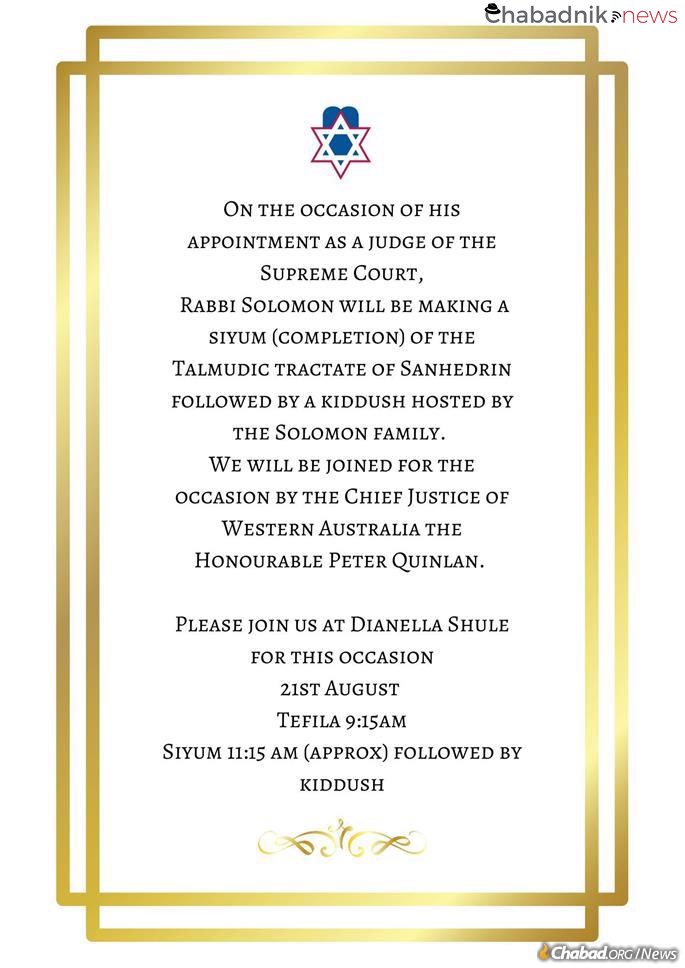
Q: Are you the first Jewish judge on Western Australia’s Supreme Court?
A: I am the fourth, but the first observant Jew. The three before me were Albert Wolff, who sat on the court from 1938 to 1969, in his last decade as chief justice; David Ipp, a South African Jew who was on the court between 1989 and 2002; and James Edelman, who was on the court from 2011 to 2015. He’s now on the High Court in Canberra—the highest judicial appointment in the nation.
Albert Wolff, interestingly, was halachically Jewish, but he didn’t practice and married out. He was appointed in 1938, which, ironically, was the year that the Nazis (may their name be blotted out) banned Jews from practicing law and stripped all Jewish judges of their commission. In that year, the Western Australia Supreme Court appointed a Jew for the first time to its court!
The interesting thing about Albert Wolff was that his grandfather was Mordechai Shrimski. He came from London with his wife and six children in the 1880s to Western Australia. His wife was pregnant and gave birth to twins onboard the ship, and they all died—the mother and the two babies—and they had to be buried at sea; you couldn’t keep a body on the ship. That ship also carried the first sefer Torah to arrive in Western Australia. He arrived here—if you can imagine Western Australia in the 1880s—with six children and no wife to a tiny Jewish community. I recently found a Torah scroll in the old shul that he donated in the 1890s in memory of his wife.
One of those six children was Albert Wolff’s mother. Mordechai Shrimski’s oldest daughter was my great-grandmother, and I am named after him, Mordechai (Nosson). So, in fact, my grandmother was a first cousin with this Albert Wolff. The family didn’t speak much of him, even though he reached very great eminence and great heights, because they thought he turned his back on his people and his community. But he was my grandmother’s first cousin, and his grandfather is my great-great-grandfather. That’s a nice little personal twist.
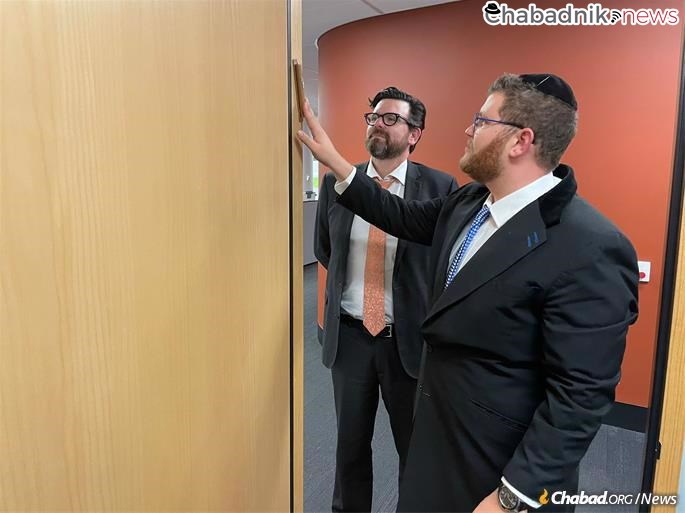
Q: As a second-generation Australian myself, that’s impressive! How far back does the other side of your family go?
A: My father’s family came much earlier, they were convicts from England—I have about two or three convict lines—my ancestor, Nathaniel Lyon Nathan, arrived in Sydney on the Royal Admiral in 1800. He was sentenced to seven years in Australia for theft. Many of his children settled in Australia and New Zealand. His daughter, Rosetta Nathan, married Moses Joseph in the first recorded Jewish wedding in Australian history.
My father’s grandfather, Lewis Solomon moved to Newcastle (a town 100 miles north of Sydney). He married Esther Lipman, who was from one of a small number of European Jewish families living in Newcastle. My father, Geoffrey Solomon, was the president of the Newcastle Hebrew Congregation between 1956 and 1970. My grandfather, my father and I were all born in Newcastle.
When the community was dwindling and because my parents wanted me to go to a Jewish school, we moved to Perth, where my mother was from. I was a little boy and went to the Jewish school there.
Q: Tell me a little about your family, have your kids followed in your footsteps?
A: I have six children: three boys and three girls. I teach, I’m a rabbi, and I’m a lawyer. My boys joke that it’s taken three of them to follow in my footsteps: There’s a rabbi, one who’s a lawyer and one is a teacher. My eldest is the rabbi of the Mizrachi Shul in Sydney; I have a son in Melbourne, who is a lawyer; and my youngest son is a math and physics teacher at Yavneh College in Melbourne. My oldest daughter is a doctor; the other one is studying history and teaching; and my youngest is still at school.
My brother is David Solomon, an internationally noted scholar and educator who lives in Melbourne. He is also the editor and translator of a forthcoming first full English translation of the Tikkunei Zohar.
Q: You are well-versed in both Jewish law and secular law. What are their commonalities?
A: That reminds me of a story. I was once arguing a case in front of Justice Edelman, when he was on the Supreme Court of Western Australia. The firm I was representing was rejected by a governmental licensing authority to trade during certain hours. They wanted to overturn this decision of the licensing authority. The argument was that the licensing authority had made its decision on the basis of an issue that the firm had not been given an opportunity to comment upon. In law, that’s what’s called a denial of natural justice.
I argued the concept of a denial of natural justice, and Justice Edelman, who knows my background well, began the judgement by quoting a verse in Bereishit, where G‑d asks Adam,“Ayekah? Where are you?” when He knew the answer because He had to give Adam an opportunity to explain himself before passing judgement.
I ended up doing a series of seminars with Justice Edelman on natural justice, unjust enrichment, and a series of things in Jewish law and civil law.
There are always these moments where you feel informed by that sort of background. The concepts are so similar to the Talmud that when I was cleaning out my university notes—I came more or less straight from 770 (Chabad headquarters and the Central Yeshiva Tomchei Tmimim) to law school—I noticed that for the first couple of years, my notes were all in gemara loshen (“Talmudic dialect”) because it was much quicker for me to write the notes of the legal concepts using nafka mina and yesh omrim—almost all my notes were in Hebrew and Aramaic.
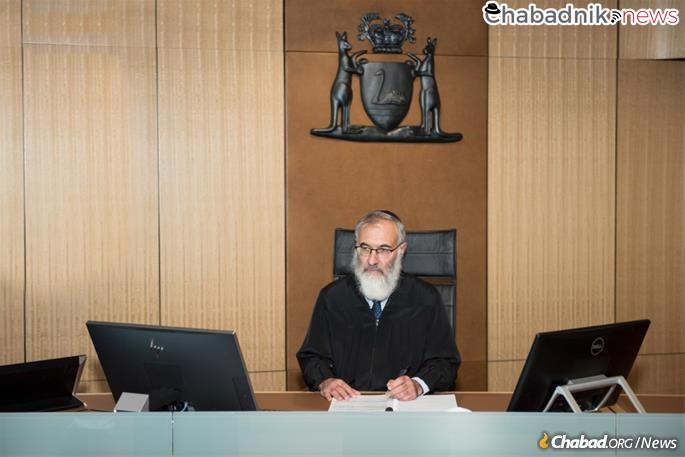
Q: What is the overarching difference between the Jewish and secular legal perspectives?
A: There is a dispute in the Talmud whether the ultimate objective is the application of din (“strict law”); the conflict, the tension, between din and pesharah (“compromise”). It’s an entire discussion in the Talmud and one opinion rules that compromise is forbidden because how can you have an outcome that is inconsistent with the law of G‑d? If the law represents ratzon Hashem (“G‑d’s will”) and what G‑d wants in terms of the governance of human relations, who are we to enter into a compromise? That places human intelligence above the application of G‑d’s law. That’s one view. The other view is that G‑d wants us to have compromise because pesharah brings shalom (“harmony”) and shalom is more important than G‑d’s own din.
The final, codified ruling comes down on the side of pesharah because in Judaism, although we’re a religion of law, ultimately, human harmony is more important.
Therefore, in Judaism you have a concept that does not exist in a secular system. When you go before a Beis Din (“rabbinic court”), the Beis Din is obliged by halachah to offer the litigants a pesharah. In secular law, there is a very bright line between compromise and the application of the law; courts and judges only apply the law, they do not engage in the negotiation of a compromise and try to reconcile the parties with each other. If you want to go and settle—to compromise—go next door; let us know if you compromise, that will be lovely. If not, we will apply the law. In Jewish law, there is a concept of judicial compromise. That means that the Beis Din invites—not just invites, they urge—the parties, to authorize that the Beis Din come up with a fair pesharah, with a compromise.
Now, the idea that the judges themselves—or the judge himself—should fashion a compromise, something other than the strict application of law, is completely foreign to secular law. In Jewish law, not only is it part of the law, it’s an obligation of the court. Because the ultimate objective of Jewish law is to bring about reconciliation and human harmony; that is more important to G‑d than the application of G‑d’s law. And that’s an important difference.
That difference weighs upon me most in my practice of the law. That is: the courts and the judges only apply the law. They’re not there to bring about human harmony, that’s just not their job. Because the secular system of law doesn’t provide for that really, whereas that stands at the center of Jewish law, which is an irony, because everyone thinks of Jewish law as being a very hard and fast application. But actually, it’s much more concerned with human harmony and reconciliation.

